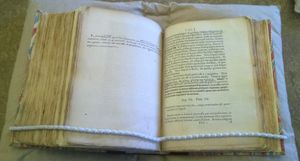John Naughton has a nice column in The Observer today. He talks about how as part of welcoming Dan Cohen to Cambridge, the University Library prepared a display around Newton’s Principia. John enjoys the experience …
I’ve owned a beautifully produced facsimile of the Principia for decades, so it wasn’t the novelty of seeing it that took my breath away. It was the work’s amazing presence. The centuries seemed to dissolve as we bent over the pages to read Newton’s neatly composed amendments, just as he must have crouched when he was writing them. For a few magical, eerie moments, it seemed as though he was there in the room with us.
Afterwards, I was reminded of Walter Benjamin’s celebrated – if exasperating – essay on The Work of Art in an Age of Mechanical Reproduction in which he tried to figure out what happens to authenticity in an age of perfect copying. “Even the most perfect reproduction of a work of art,” he wrote, “is lacking in one element: its presence in time and space, its unique existence at the place where it happens to be.” This “aura” that emanates from original works – which is, Benjamin argued, stripped away by reproduction – is hard to pin down (and Benjamin doesn’t really nail it, in my opinion) but, believe me, you know it when you feel it. And not even Google can digitise it. // For a moment, I was in the presence of Newton’s genius
One of the benefits – and hazards – of blog writing is that you can dip into lots of topics without following through in fuller detail. The blog is a place where you can work out a view, without necessarily developing a fuller argument. Occasionally, blog entries, or a series of blog entries, can turn into something longer. I have written several articles – this on the long tail for example – based on earlier blog entries.
Several years ago, I talked about Benjamin’s aura in the context of digitization in several entries:
- Aura again: haba sua fata libelli
- Aura and digitization
- Aura, Google Print and digitized library books
At the time I spent a while looking for discussions of the impact of digitization on various aspects of ‘aura’ in a library collections context: on the notion of the coherence of a collection, on the artifactual properties of books, on the provenance and patterns of ownership of books, on the nature of the reading experience, and so on. Clearly, these are topics of interest in archival and conservation domains, but I found surprisingly little relating them to library interests.
Now, Benjamin’s essay and the notion of ‘aura’ itself are certainly fashionable, and, as John Naughton points out, the concept of ‘aura’ itself remains vague. Nevertheless, it seems to me to be a very suggestive idea for us. Maybe at some stage, I will find some time to think for longer than a blog entry’s length about it 😉
[Incidentally, John points to a copy of Benjamin’s essay on the Marxists Internet Archive. I know nothing about this beyond what a quick look and the Wikipedia entry for it tell me. Interestingly, it has assembled a lot of material – see the entry on James Connolly for example – and seems to be operating on a voluntary basis.]
Picture: I took the feature picture of a first edition of Principia annotated by Newton at Cambridge University Library.
Note: Cosmetic amendments on 3 April 2021 include addition of picture and fixing spacing.




